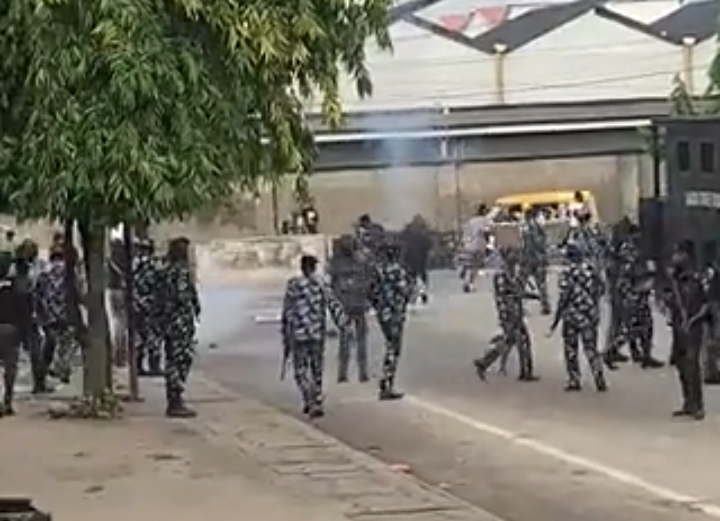Police officers fired tear gas to disperse students of the University of Lagos (UNILAG) who were protesting the institution’s recent fee hike.
Undergraduates at the university took to the streets of UNILAG campus at 8 am on Wednesday to register their concerns.
In July, the federal university announced an upward review in its fees meant to take effect from September 1.
This put the sessional mandatory charges for new undergraduate students at ₦126,325 for courses without a lab/studio and ₦176,325 for one academic session for courses that use a laboratory or studio.
The sessional mandatory charges for returning students were put at ₦100,750 for courses without labs and studios while that of courses with access to labs and studios were fixed at ₦140,250.
UNILAG also said the approved charge for all medical students of the institution is ₦190,250.
For some returning medical students, the changes amounted to an “unsustainable” 900 percent hike.
The National Association of Nigerian Students (NANS) had previously shelved a planned protest on the matter.
But on Wednesday, at least 40 UNILAG students cordoned off the entrance to the university in protest.
A student source told TheCable that armed police, in their numbers, stormed the area to disperse the protesters with teargas.
Happening Now:
AdvertisementUnilag Junction.
Policemen seen firing teargas at unarmed and peaceful protesters.#PEPTJudgement #AllEyesOnTheJudiciary pic.twitter.com/GA0t9wGczJ
— Lawrence I. Okoro ( Sir Law ) (@LawrenceOkoroPG) September 6, 2023
“They increased our fees from 21,000 to 210,000. That is like a 1000% increase,” the source lamented.
“We came to talk to the UNILAG management to reverse this fee hike. Too many people will drop out. Too many people cannot afford it.
Efforts to contact the UNILAG management proved abortive as of when this report was filed.
Benjamin Hundeyin, spokesperson to the Lagos police, also did not immediately respond to enquiries on the matter.
Nigerian universities are dealing with a sustainability crisis occasioned by rising costs of living.
In July, Nigeria’s inflation hit 24.08%, the highest in more than 10 years.
Food inflation had risen to 25.25% in the previous month — caused by increases in the prices of oil and fat, bread and cereals, fish, potatoes, tubers, fruits, meat, vegetables, milk, cheese, and eggs.
Following President Bola Tinubu’s inauguration — after the 2023 elections — and his successive announcement of the discontinuation of the petrol subsidy, fuel pump prices surged by around 225% (from N210 up to nearly N700 per litre).
The resultant increase in transportation costs and power generation expenses caused a further spike in commodity prices that left the logistic costs incurred across Nigerian universities at a high.
Consequently, many universities are either planning to raise their fees or have done so in a move that some stakeholders argue will defeat the idea of tuition-free education among federally-owned tertiary institutions.
Among the federal universities that have raised their fees apart from UNILAG are the University of Maiduguri (UNIMAID) in Borno and the University of Benin (UNIBEN) in Edo.
Others Abubakar Tafawa Balewa University (ATBU) in Bauchi and the Usmanu Danfodiyo University (UDUS).
Copyright 2025 TheCable. All rights reserved. This material, and other digital content on this website, may not be reproduced, published, broadcast, rewritten or redistributed in whole or in part without prior express written permission from TheCable.
Follow us on twitter @Thecablestyle

